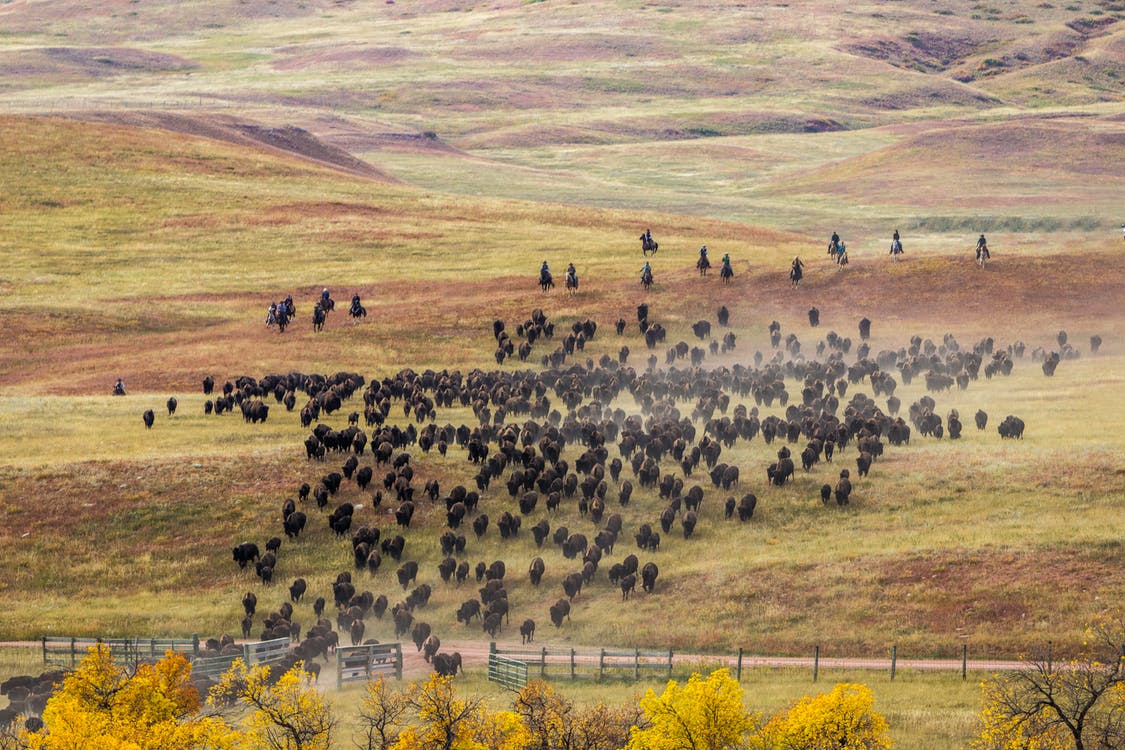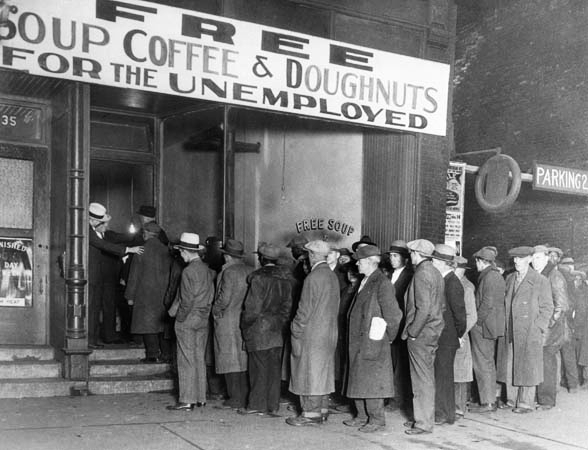Bear market FIRE strategies - Can you handle the truth?
The bull market we’ve had will be ending soon. This is just natural. Markets go up and markets go down. The bull market has been active since about 2010, fueled by low interest rate money but with the natural market cycle spurred on by the China Trade Wars, it won’t last much longer. What should those pursuing FI or FIRE do to adjust? Do they have what it takes to handle this?
If you ask any investment advisor, you will be told that diversification is key to risk management. Those that tell you this are probably poorer than you are. I don’t hear that being said much when the equities markets are at all time highs. But what about the Bear markets.

Everyone tells you to invest in the stock market, but just imagine this scenario…
The stock market drops 50%. That means your investment capital drops 50%. Yep, not just your returns but your actual capital. For anyone who has worked damn hard to save, save, save and put all that money into the markets (either directly or indirectly through indexed funds, etc.) you are going to take a serious hair cut with such a down turn. But is this likely?
In 2008, only 11 years ago, the markets dropped from DJIA highs of 14,164 on October 9th, 2007 and dropped to a market low of 6,469 on March 6th 2009. It lost 54% of its value in that period. https://en.wikipedia.org/wiki/United_States_bear_market_of_2007%E2%80%9309
If you have $1 million saved and you are banking on living off 4% of that money (about $40K per year), imagine if you now have $500K because the market dropped. Now you are going to live on $20K per year. That’s probably going to put you below the poverty line in the USA. Meanwhile natural inflation rates are increasing, Federal Reserves slash interest rates to try and counter the drop, and your base level interest on savings is now 0%... Well you get the picture.
Is this likely? Sure. But what is really happening?
Wealth doesn’t just disappear
It might feel like someone just burst your balloon. But the fact is that capital doesn’t just disappear. It moves. Because while one person might have lost 50% of their net worth, someone who had money in cash at the time, can swoop in and buy up stocks at 50% of their face value, wait a while and see massive returns on their money. Who would you like to be? The winner or the loser? Really what has happened here is that the wealth transferred from those exposed to the markets to those with lower exposure.

Hence the value of diversification. If you are banking on the traditional economic markets to save you when they collapse like this, then you are going to be on the loser side of the equation. And if someone is telling you about the historical returns of the stock market over time, they are dancing around the point that those that time the markets win big-time here. They are assuming that you can trust someone in Vanguard or Fidelity or whoever to time the markets for you. Yeh right. That didn’t work out so well in 2008 did it, with Lehman Brothers & Bear Stearns just collapsing. If you relied on those experts to look after your money, you would not have any money.
But if you had a stockpile of cash, you could have bought some bargains and years later doubled or tripled your wealth. Of course the cash would not really be giving you much of a return while you sat on the sidelines, but if you can see the obvious coming, would you not want to be prepared for it? I mean bull markets don’t last forever. That is a fact. The question is when do they turn?
Safe Havens
There are some pretty predictable historical facts that might help you put some money on the sidelines in a protected place. One such safe haven that the wealthy have used for years is Gold & precious metals. Gold backs economies and currencies. Sure, Nixon moved us off the gold standard in the 1970s, but he didn’t move China, Russia, UK, Germany or Japan off that standard. Gold is gold. Physical and you put it in a vault somewhere.
Whereas that sounds interesting, most people who think they have invested in Gold or other precious metals actually invest in stock market ticker symbols (GLD) which is subject to the same downside of stock market movements and manipulations as every other ticket on the Dow. Physical gold, however, is just that – physical. You hold it, you weigh it, and it has a value per ounce. And although you have to provide the security to your gold, you have access to safety deposit boxes at banks to help you secure your treasure here.

I bought physical gold a year or so ago at around $1,180 an ounce. Today it is worth about $1,300 an ounce. Not a bad return. But if the SHTF in the stock market, that gold will be worth $1,800 or so an ounce. How can I make that statement? Well when the SHTF in 2008, gold went from its lows of $833 an ounce, to its highs in 2011 of $1,895 an ounce. Yep, more than doubled in value in 5 years.
The key here is that you take over control of your treasure. You take it from a Wall Street expert, and you put it in a safe somewhere. Back to old school treasure management. Historically the value of gold is a counter point to the value of the stock markets and although its price does get manipulated, an ounce of gold is an ounce of gold. It can’t just disappear like a paper asset such as a stock.
One other historical trend we have seen, particularly after the 2001 Dot Com stock market crash, was a move of capital out of the stock market and into real estate. This drove record property values over the 2001-2007 period that were historic. Of course that didn’t end well in 2008, but if you were on that roller coaster prior, you could have had a pretty good ride. I was there. I remember the exuberance in the real estate market. A lot of us made a lot of money in that time. Again, those hedge funds that underwrite state pension funds, unions, and other mega organizations, need to get a return on their money too, so they have to move vast amounts of capital from one market to another. Real estate is normally a boring 4% increase per year, but if the brokers think that it is undervalued, they will put billions into the market, forcing pricing up due to basic supply & demand curves.

But more importantly (at least to me), a physical piece of property is something you can touch. It has value because people need a roof over their heads. It is a basic part of our survival. It is the shelter part of the Maslow pyramid – the physiological layer. When people choose what they will or will not pay, normally (at least for those that are not deranged fools), they will pay their rent before they pay their credit card payments. Why? Because they don’t want to be turfed out onto the streets and made homeless.
One clarification here – you might think you own real estate. You probably don’t. If you have a title document to a piece of property, but that title is secured with some deed to a bank because of a mortgage, you don’t “own” that property. You might have some partnership interest in it with a bank, but you don’t own it. So if the bank falls on hard times and wants to call in the mortgage, you are screwed. Just remember, true real estate ownership is when you have freehold ownership. You need to be laser focused on achieving that. If you own that property, then it can be the goose that lays the golden egg – in good or bad times. People have to pay rent, and better they pay it to you and you keep it. Not that you take the rent, pay the mortgage off and keep the bits left. That isn’t a sustainable position.
Just remember real estate is not a liquid investment. You cannot quickly extract money from it and move it quickly somewhere else. If you consider real estate as a part of your portfolio (which I do) it is because you chose to be in it for the long haul. And if you are in it for the long haul and you trust your investment partner (the bank with a mortgage), then you can generate wealth by having the rents pay off your principal for you, so you don’t have to. That’s organic wealth creation and something I will go into greater detail about on other posts. But consider that real estate should be a part of a diversified wealth strategy.
Another safe haven which many forget about is using global investments. Although markets are interlinked by the backing of countries around central currencies, often when a market (say the USA) has a down cycle, it might take some time for the ripple effect of that to roll out to other countries. That ripple effect gives you some time to see into the future a bit. An investment in real estate in one country might be going up, while it is going down in another. Geo-diversification is great, but you better be willing to become an expert in the economies of each region you are investing in. That takes some effort and you have to be diligent to keep on top of news, visit the region and get a sense of what is going on there “on the ground”. For me, I combine this with regular travels because I love to travel. For you, better to have the time and ability to roam the globe.
And one final part of my safe haven strategy is crypto-currencies. Most people think this is the highest risk investments out there. Sure, it can be. I mean plenty of people have lost massive amounts of their investment portfolios by poor market timing in crypto. The FOMO (Fear of Missing Out) mindset drove the 2017 price insanity, and then later entrants got REKT. But here’s the thing…
If there is a loss of faith in traditional FIAT currencies, that typically happens in a bear market, there will be a move to non-traditional, non-FIAT investments. Bitcoin is backed by math. Not by perception. It isn’t money that can just be invented. There can only ever be 21 million Bitcoins mined. So as there are less and less of them being generated, the natural price has to go up. Sure, this is tied to utilization but we are doing more commerce on digital platforms – not less. And if the faith in banking drops, then being able to hold your own private keys (just like the concept of holding your Gold in a safe) becomes fashionable, then the value of your crypto should go up. Maybe exposure here might be something you want to manage, but just as it is a horrible experience to invest in something and see it drop 50%, the same could be true of not investing in something and missing out on a 100% increase in value. In both cases, you don’t get to enjoy the wealth.
My strategy
I’ve made millions in my life. I have NEVER invested in the stock market and made any money. All of my wealth has come from businesses, real estate, crypto-currencies and gold. So when I see FIRE folks sharing their success stories with Vanguard Index funds, you can probably understand my skepticism. It isn't that it won't work, but it just isn't for me.
Look, I know that there are more people who have created wealth in the stock market than those who haven’t. I’m an outlier. I’m a contrarian. But isn’t that why you are reading this article?
The fact is that the herd gets slaughtered. Those that choose to have little or no interest in their investments and give their money to a trusted third party to look after it for them, are the lambs to the slaughter when times go bad. You think that broker working at Vanguard has any actual interest in your financial well-being? Nope. They just want their salary check and ideally their bonus check, and that’s all they care about. You are hoping you can tie your wagon to their success, but their success may not be your success. And when the SHTF, you are the last thing on their minds.

So I protect my treasure. I’m not obsessed by it. But I’m diligent. I know that when an opportunity presents itself, I need to be able to capitalize on it quickly. I need to have the ability to move speculation money from one liquid investment into the opportunity. And I know that a majority of opportunities don’t pan out. Venture capital firms that invest in businesses assume that with 10 investments, 5 will lose money, 3 will make a small profit or break even, 1 will do good, and 1 will be a blockbuster. The sum of the blockbuster + the other positive returns far outweighs the losses and that’s how they do it. Rinse & repeat.
If you don’t accept that risk is a part of the game, then don’t get into the ring. And if you put your capital in the ring, betting on a boxer to take the hits for you, know that gambling never really pays off. Better you learn to participate in your investments, than to be hands-off and soon the investments will leave your hands entirely.
That’s my strategy. It has worked very well for me over 40 years, and in multiple countries. I’ve learned the legal & tax laws closely and I surround myself with a team of lawyers, accountants and advisors. I don’t expect them to tell me ahead of time about things, but I do expect them to be there when I have a question or to steer me in the right direction.
Knowledge is power.
The risks of FIRE
If you are working 50 hours a week, living frugally and saving your money, you have some serious skin in the game here. Every dollar you earned, came from your labor. You toiled, put up with a horrible boss, had to deal with bad customers, annoying work mates, etc. Every day that you had to get up in the morning to drive to work made you cringe. You sat in the office, in the cubicle or in the hot sun working hard, thinking, “Man one day I can dump this job and go live on a beach in style”. You read all the FI blogs, you listened to the podcasts, you watched the documentaries and you read the books. You shared something in common with everyone else – no one wants to go through life like that. There has to be a better way.
You saw many succeed, at least that is what they told you. They told you about the 4% rule. The hacks that let you escape the rat race and live a purposeful life. “This is exciting stuff”, you thought. And it is. You wanted to surround yourself with like minded thinkers who share the same passion. You wanted to be financially independent. I mean, the math must work, right? There has to be a way.
Sure, there is. But if you follow the herd you will get slaughtered. And the more people who blindly go into the world of FI, create a herd like mentality that is going to be slaughtered. Sure, there are always winners & losers in life. But for every winner, there are 10 losers. Like the Venture capital firm investments. Your chance is far greater to lose at this lottery than to win.
Rather than blindly go into the FIRE world, how about you begin to train your brain think like the rich. Be the contrarian and realize that the buck stops on your desk. That you control your investments and you own the results of them. That you don’t have to give up your skills to be super wealthy. In fact if you transition what you are good at, into a way to make money at it (without some massive use of labor), then you can be wealthy.
The rich don’t have jobs. Period. You can take that statement to the bank. To be financially independent, you must be rich. Therefore it is simple – you need to find a way to be rich without having to work for the money. And if this was easy, everyone would do it. Economies would collapse, no one would serve you at the restaurant, and nothing would get done. 99% of the world must participate in the work force in some way. The entire western economy is based on that.
But 1% of the world doesn’t. If you want to be in that 1%, you won’t be if you adopt the same practices as the other 99%. You can’t be in the 1% by just following the same path as everyone else in the FIRE community. Trust me – there is NO 4 hour work week. That is pure BS and if you believe that, I’ve got some swampland in Florida to sell you. You might WANT to believe it. But it isn’t true. You have to be a participant to succeed with wealth creation. Because if you are not there, people won’t work for you. Your willingness to demonstrate that you are serious about the venture is infectious. But your lack of interest is just as infectious. You will spend all your time trying to build a team to do something, then watch that team disappear because they have no faith in your leadership, forcing you to rebuild a team again, etc. You get the idea. You have to participate in life. Life won’t reward you without your participation.

For those that don’t actively participate in their own economics, when the economy goes into a bear market, they have little coping skills for it. They haven’t been around the block and been from zero to hero, to zero to hero, again. They haven’t made millions, lost millions and then made millions again. They haven’t learned the survival skills in the worst of times. If you are taking advice of anyone that hasn’t lost it all and came back from it, then you are listening to the uneducated. Failure is the only actual life lesson that matters because it really teaches you how to be an expert in something. Only those that have failed miserably and came back from it, are the real teachers.
You will fail if you want to join the 1%. That’s a guarantee. You need to be prepared for that. You need to not expose yourself to when that happens because it will. Adverse events are part of life. And you don’t control them. You don’t control divorce, death, medical emergencies, accidents, business lawsuits, economics, war, etc. These things happen every day. Just turn on the nightly news and realize that what is going on, in the square screen you are looking at, is real. Most of the time you are a spectator to it; some of the time you are a participant.
Those that have the tenacity to stick it out, the diligence to just get back up and keep fighting, eventually earn their place in the 1%. This is an ongoing part of life. You must keep getting back up and going back out there. Eventually you will have the story to tell others. You will be a worthy participant and then you will truly find your peeps in that community.
I challenge every one of you to have a risk mitigation strategy that is bullet proof. I doubt you will find one. But at least try. Because maybe you can protect yourself from the majority of adverse events that will come your way, but if you choose to give up your job, lose your skills, get rusty, and think that you can do just great on your 4% rule and living on the beach, you will be sorely disappointed. After a few months, you will be clamoring to get engaged with something meaningful. You will atrophy your skills if you don’t exercise them, and maybe you will learn that 99% of the world are meant to work for someone else. It is one thing to want to be in the 1% but be careful of what you wish for. It takes a lot of mindset change to be there, and stay there. And the waters are not calm.
I challenge anyone on the FIRE path to learn to think rich and be a business person. Learn to deal with the day to day calamities that come with participation in an economy that you control. You will soon learn your strengths and weaknesses. You will learn to deal with your reliance on others. You will learn the true value of money and you will learn the skills to handle when someone else lets you down. This is part of life and you better be prepared for it. Because when you give up your income producing methods in favor of a stock market broker to let you stay on the beach, when the market isn’t in a bull market, that’s when the true character of those you put your faith in will show. In times of chaos, the true nature of a man will be demonstrated.
There is no 4 hour work week. That made its author a lot of money and notoriety but it isn’t real. Just like any 3AM infomercial trying to tell you that you can make millions with some new investment strategy if you just make your 3 easy payments of $99 a month to get their video course. It isn’t real. FIRE may seem real for some, and in a bull market it surely can work. But bull markets don’t last forever. When they turn, the true rich and wealthy will emerge and you will see then whether you are part of that collective, or part of the herd heading to the slaughterhouse.
Tough words – I know. But better you hear this now, ahead of time, than afterwards when you quit your job, you are no longer competitive in the marketplace, the economy is in a bear market and unemployment is high again. That’s when you won’t easily find a job, and if you do, it will be at far lower pay scales than when you were the “expert” in your industry. And just watch the number of blogs, podcasts, etc. that start to disappear when that happens. It is hard to talk negative. Faith based participation relies solely on faith which is fed by positive outcomes.








